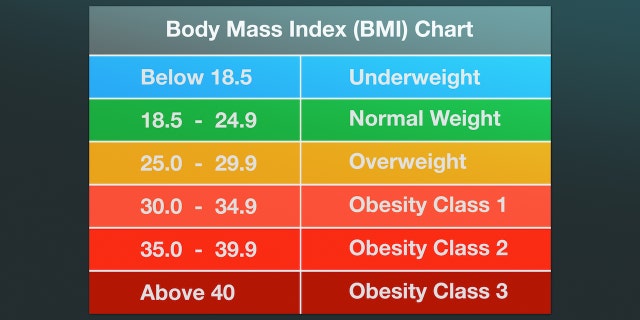Health
BMI measurement deemed ‘racist’ in new medical report: ‘This is politics, not medicine’

The American Medical Association (AMA) is now discouraging the use of body mass index (BMI), calling it an “imperfect” and “problematic” means of assessing body fat and claiming it has been used for “racist exclusion.”
The comments were included in a report presented at the 2023 AMA Annual Meeting in Chicago, Illinois earlier this month.
“BMI cutoffs are based on the imagined ideal Caucasian and [do] not consider a person’s gender or ethnicity,” the report stated.
WEIGHT LOSS SURGERIES ON THE RISE AMONG KIDS AND TEENS, STUDY FINDS: ‘ALTERING THE ANATOMY’
The AMA also claimed that the history of the BMI is rooted in “eugenics,” which is “the scientifically inaccurate theory that humans can be improved through selective breeding of populations,” per the National Human Genome Research Institute.
What is BMI?
First created back in the mid-1800s by a Belgian mathematician named Lambert Adolphe Jacques Quetelet, the BMI has been the international standard for measuring obesity since the 1980s, according to many sources, though some experts have questioned its validity.
A person’s BMI is calculated by dividing his or her weight by the square of his or her height in feet.
The American Medical Association (AMA) is now discouraging the use of body mass index, or BMI, as a means of assessing body fat. (iStock)
For example, someone who is 5’5″ and 135 pounds would have a BMI of 23.2.
On the BMI scale, any number lower than 18.5 is considered underweight, according to the Centers for Disease Control and Prevention (CDC).
A measurement between 18.5 and less than 25 falls within the healthy weight range.
Someone with a BMI between 25 and 30 is considered overweight.
Any measurement 30 or higher indicates obesity — while a number of over 40 qualifies as severe obesity, according to the BMI scale.
Some say BMI linked to ‘White supremacy’ and ‘history of harm’
The National Alliance for Eating Disorders, based in Florida, has voiced its support of the AMA’s recommendation to de-emphasize the BMI.
It also called for it to be scrapped altogether “due to its racist and sexist standards and long history of harm, including harm toward those most marginalized in our communities.”
DRINKING A GALLON OF WATER PER DAY: DOES IT REALLY HELP WITH WEIGHT LOSS AND FITNESS?
“We advocate for the recognition of weight diversity and hope that the medical field prioritizes health measurement tools that take into account the many factors that contribute to and impact a person’s health status,” said Dr. Katie Mittelstaedt, outreach and clinical consultant for group, in a statement to Fox News Digital.
Another eating disorder support organization, Project HEAL in Brooklyn, New York, echoes the claims that the BMI is rooted in racism.

First created in the mid-1800s, the BMI has been the international standard for measuring obesity since the 1980s. (iStock)
“The BMI is based on research from the 1830s meant solely to study populations of white European men and does not have the medical relevance or authority it has been purported to have,” said Serena Nangia, spokesperson for Project HEAL, in a statement to Fox News Digital.
WHITE POTATOES VS. SWEET POTATOES: NUTRITION AND HEALTH EXPERTS CHIME IN ON WHICH IS BETTER
“BMI has for decades been held inaccurately as the gold standard for the measurement of health, but its origins, as well as its uses, are rooted in white supremacy.”
‘It’s not racist — it’s called good medicine,’ doctor says
Dr. Marc Siegel, professor of medicine at NYU Langone Medical Center and a Fox News medical contributor, spoke out against the AMA’s stance on “The Ingraham Angle” earlier this week.
“I didn’t believe the AMA was going to get involved in cancel culture, but now they’re canceling the body mass index, which is the thing I look at to at least start me off in the direction of obesity,” he said.

The AMA’s call to abolish BMI could inhibit the ability to get insurance companies to pay for treating obesity, warned one doctor. (iStock)
The doctor said he uses the BMI as a basic guideline to determine whether a patient is in a category that requires closer monitoring.
“It’s not racist — it’s called good medicine,” he said.
Dr. Siegel said he believes the AMA’s new policy was fueled by the body positivity movement — but he cautioned that removing the BMI measurement is a step in the “wrong direction” and could “lead to bad health outcomes.”
He said, “We don’t have enough prevention as it is, and we’re moving away from prevention.”
Removing the BMI measurement is a step in the “wrong direction.”
The doctor warned that the AMA’s call to abolish the BMI could inhibit the ability to get insurance companies to pay for treating obesity.
While Siegel does agree with the AMA’s assertion that visceral fat — which is fat that’s found in the abdomen — is the most worrisome type, he said he still relies on the BMI as an overall indication of whether someone is at a higher risk of diabetes, heart disease, cancer and high blood pressure.
CLICK HERE TO SIGN UP FOR OUR HEALTH NEWSLETTER
“I don’t need someone taking a tool out of my toolbox, and that’s what they’re doing here,” he said.
“This is politics, not medicine.”

Health
Service dogs save veterans, plus men's energy boosters and safe swimming tips

Marine Corps veteran Bill Lins, a sergeant from 2004 to 2016, is pictured here with his dog, Link. Lins suffered from PTSD and a traumatic brain injury after he left the service. (K9s for Warriors)
MAN’S BEST FRIEND – Veterans with PTSD get significant benefits from service dogs, the first NIH-funded study found. A vet shares his story. Continue reading…
DEADLY BACTERIA – Health officials are investigating as a potentially fatal infection spreads in Japan. We have the latest. Continue reading…
ENERGY BOOSTERS – Experts identify the 6 most common culprits that zap men’s vitality – and offer ways to counteract them. Continue reading…

For Men’s Health Month, several doctors shared with Fox News Digital some common reasons for the decline — and tips for getting back up to speed. (iStock)
ALZHEIMER’S ANSWERS – Mayo Clinic has rolled out a new, non-invasive blood test that detects the common dementia with greater ease and accuracy. Continue reading…
TRIGGER GENE – Scientists have discovered a common genetic trait that exists in 95% of people with inflammatory bowel disease. Here’s how it could impact treatment. Continue reading…
GIVING BACK – Megan Stuart, 20, has overcome premature birth and pediatric cancer – and now the Irish dance champion is raising money for the hospital that saved her life. Continue reading…

Megan Stuart was diagnosed with stage 3 neuroblastoma shortly before she turned 5 months old. Miraculously, the chemotherapy she received as an infant does not appear to have had any lasting effects on her life. (Courtesy of Megan Stuart/Shamrock Photography)
ASK A DOCTOR – “Why do I keep eating foods that I know are bad for me?” Continue reading…
STRONG FINISH – From shoes to smartwatches to snacks, these 22 items will keep you running comfortably on marathon day. Continue reading…
SAFER SWIMMING – Water safety experts share 8 tips for preventing drownings at the pool and beach this summer. Continue reading…

Each year, some 4,000 unintentional drowning deaths occur in the U.S., with the highest rates among children between 1 and 4 years of age. (iStock)
FOLLOW FOX NEWS ON SOCIAL MEDIA
YouTube
SIGN UP FOR OUR NEWSLETTERS
Fox News First
Fox News Opinion
Fox News Lifestyle
Fox News Health
Fox News Autos
Fox News Entertainment (FOX411)
DOWNLOAD OUR APPS
Fox News
Fox Business
Fox Weather
Fox Sports
Tubi
WATCH FOX NEWS ONLINE
Fox News Go
STREAM FOX NATION
Fox Nation
Health
How southern European nations will be among the highest life expectancies worldwide

Life expectancy is expected to rise worldwide by 2050, according to findings recently published by The Institute for Health Metrics and Evaluation at the University of Washington.
The institute cites many factors for its findings, including “declining deaths from cardiovascular diseases, respiratory infections and tuberculosis, and maternal and neonatal death.”
While the study has outlier countries with much greater gains in lifespan – Singapore tops the list with an estimated life expectancy of 88 – the region of southern Europe, despite poor GDP, has also made strides.
HEALTH EXPERTS WEIGH IN ON THE BENEFITS, RISKS OF USING CASTOR OIL FOR WEIGHT LOSS
The institute’s findings conclude that the relatively poorer southern European countries of France, Italy, Spain and Portugal will gain higher life expectancy by 2050. The world’s oldest living woman at 117, Maria Branyas Morera, is Spanish.
Despite these relatively poorer countries scoring low on GDP in comparison to their high life expectancy, they all possess common characteristics. Normally, more wealth correlates with better health worldwide.
A man in a wheelchair is seen at the Somorrostro Beach in Barcelona, Spain. (Jakub Porzycki/NurPhoto via Getty Images)
Unlike their fellow top 20 lifespan countries in the study, like Switzerland or Denmark, health might not mean wealth for these southern European nations.
A 2017 study reveals that Spaniards take 5,936 steps per day on average. For reference, the average American makes only 4,774 in the same study. The cultural heritage of daily movement like walking in nations like Italy and Spain may contribute to their projected high life expectancies.

People sit outdoors at a cafe in Barcelona, Spain. (Jakub Porzycki/NurPhoto via Getty Images)
Additionally, Spanish cities are built more densely populated than their counterparts. Regular social interaction could contribute to higher life expectancy. A 2023 Gallup poll among Spaniards found that just over three quarters, or 76%, reported feeling “fairly” or “very” socially supported.
Intergenerational family living is also more common among Spaniards than Americans, with the same poll reporting that 83% of Spaniards had seen “friends or family who live with you or near you” in the same week of polling.
The institute projects France, Italy, Portugal, and Spain having life expectancies in 2050 somewhere between 84 and 86 years.
Health
8 top health stories of the past week that you need to know now

All week long, Fox News Digital keeps you up-to-date on the latest wellness news — clinical trials, medical research, new medications, cutting-edge health technologies, success stories and more.
In case you missed them, here are a few of the biggest health stories from the past week.
As always, you can see a full list of recent health pieces at http://www.foxnews/health.
CLICK HERE TO SIGN UP FOR OUR HEALTH NEWSLETTER
1. New liver drug gets green light from FDA
The U.S. Food and Drug Administration has approved the French drugmaker Ipsen’s medication Iqirvo (elafibranor). Doctors and patients discuss how this new option could transform the landscape of liver treatment. Click here to get the story.
Patients have expressed relief at having another treatment option for liver disease. (iStock)
2. Major Alzheimer’s study reveals protective gene
In an Alzheimer’s breakthrough, researchers identified a genetic marker that delayed cognitive decline in a high-risk family. Among 27 family members with the gene, disease progression was slowed by an average of five years. Click here to get the story.

Among more than 1,000 high-risk family members, 27 of them who have one copy of a rare gene variant — the APOE3 gene, known as Christchurch — reported delayed onset of symptoms. (iStock)
3. These 6 culprits can drain men’s energy and vitality, experts say
For Men’s Health Month, several doctors shared with Fox News Digital some common reasons for energy and vitality to decline — along with tips for getting back up to speed. Click here to get the story.

For Men’s Health Month, several doctors shared with Fox News Digital some common reasons for the decline — and tips for getting back up to speed. (iStock)
4. Promising news for Parkinson’s patients
A new blood test that uses artificial intelligence could detect Parkinson’s disease up to 7 years before symptoms. An AI health care expert discusses its potential impact. Click here to get the story.

A new blood test could reveal Parkinson’s diagnoses up to seven years before symptoms emerge, according to recent research. (iStock)
5. Expert shares swimming safety tips for summer
Each year, some 4,000 unintentional drowning deaths occur in the U.S., with the highest rates among children between 1 and 4 years of age. From choosing the right bathing suit color to installing pool alarms, these eight tips can help prevent tragic accidents. Click here to get the story.

Each year, some 4,000 unintentional drowning deaths occur in the U.S., with the highest rates among children between 1 and 4 years of age. (iStock)
6. Study reveals bad news for night owls
A recent study by Stanford University, published in the journal Psychiatry Research, found that going to bed after a certain time could lead to mental health issues. Researchers and sleep experts share the negative effects of staying up past that hour. Click here to get the story.

Not getting enough sleep has been proven to compromise mental health, according to a sleep expert. (iStock)
7. Service dogs bring ‘significant’ benefits to veterans
The first study of its kind, funded by the National Institutes of Health, looked into exactly how pairing service dogs with PTSD-diagnosed veterans improves symptoms. A veteran also shares his personal story. Click here to get the story.

Marine Corps veteran Bill Lins, a sergeant from 2004 to 2016, is pictured here with his dog, Link. Lins suffered from PTSD and a traumatic brain injury after he left the service. (K9s for Warriors)
8. Kids with obesity need ‘behavioral counseling,’ task force says
The US Preventive Services Task Force says that kids and teens with a high BMI (95% or greater) should receive at least 26 hours of “comprehensive, intensive behavioral interventions.” Dr. Brett Osborn weighs in on the recommendation. Click here to get the story.

This week’s health stories included new liver drugs, sleep warnings, a new blood test for Parkinson’s, men’s energy boosters and much more. (iStock)
-

 Politics1 week ago
Politics1 week agoRule of law on ballot in NYC suburbs as cop, veteran trade barbs over border crisis, policing
-

 News1 week ago
News1 week agoIt's easy to believe young voters could back Trump at young conservative conference
-

 World1 week ago
World1 week agoSwiss summit demands 'territorial integrity' of Ukraine
-

 News1 week ago
News1 week agoJustice Department won't pursue contempt charges against Garland
-

 World1 week ago
World1 week agoSwitzerland's massive security effort at the Ukraine peace conference
-

 News1 week ago
News1 week agoJoe Biden, Barack Obama And Jimmy Kimmel Warn Of Another Donald Trump Term; Star-Filled L.A. Fundraiser Expected To Raise At Least $30 Million — Update
-

 Politics1 week ago
Politics1 week agoBiden looks to capitalize on star-studded Hollywood fundraiser after Trump's massive cash haul in blue state
-

 Politics1 week ago
Politics1 week agoJudge rules Missouri abortion ban did not aim to impose lawmakers' religious views on others















